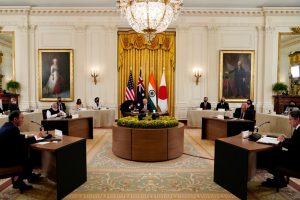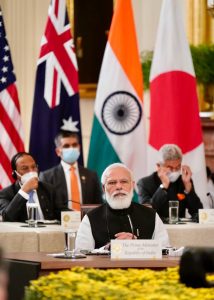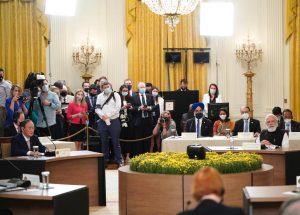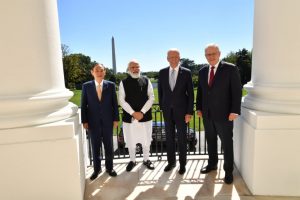
History was made on a pleasant afternoon in Washington DC as the leaders of US, India, Japan and Australia exuded democratic camaraderie, and vowed to fashion a free, open and inclusive Indo-Pacific and to play the role of “force of global public good,” in Prime Minister Narendra Modi’s words.
With China listening and the world tuned in, the first face-to-face Quad summit at the White House on September 24 between US President Joe Biden, PM Modi, Australian Prime Minister Scott Morrison and Japan’s PM Yoshihide Suga, unveiled a new democratic paradigm of tackling global challenges. Matching substance with hype that preceded it, the summit forged pragmatic and result-oriented cooperation pivoted around countering pandemic through vaccines, combating climate change and setting standards on development of emerging technologies.
In his opening remarks, US President Joe Biden crystallized the quintessence of the Quad as four major democracies working together to get things done, and take on common challenges from Covid to climate. “We know how to get things done and are up to the challenge,” he declared with a flourish. This deceptively simple expression – democracies knowing how to get things done – was meant to normatively distinguish the Quad consensus from the Beijing model of one-party state, and underscored the quiddity of Quad.
In an act of creative camouflage, China, the world’s second largest economy and an aspiring superpower, was the target of myriad initiatives, ranging from Covid to emerging technologies, that emerged from the September 24 summit. But in a case of masterly subtlety, the 2080-word joint statement did not mention China even once, making a conscious choice to avoid the game of naming and shaming.
The major takeaway from the first face-to-face Quad summit is the marked shift from rhetoric and word games to the phase of purposeful and constructive action, representing the evolution of a nascent grouping in barely six months since the virtual summit. In key decisions that mark the institutionalisation of the Quad, the summit decided to “build habits of cooperation through annual meeting of leaders and foreign ministers, along with regular meetings of senior officials and working groups. Henceforth, one can expect the Quad to move from being just one-off photo op to a year-round diplomatic affair.
The summit has fleshed out signature initiatives and deliverables whose transformative impact will be felt in days to come. These include operationalisation of the Quad Vaccine Initiative under the broader rubric of Indo-Pacific Health Security, Quad Infrastructure Initiative, resilient supply chains for semiconductors and clean energy and setting principles on development of critical and emerging technologies. In each of these initiatives, one can detect the hidden design of undercutting China, but they all stand on their own, with tangible benefits for mankind, cutting across geographies.
Vaccine Partnership

Building on the Quad Vaccine Partnership at the March virtual summit, the leaders decided to pull in their resources and expertise to be primary health security providers by deciding to produce at least 1 billion doses of COVID-19 vaccines at Biological E Ltd. facility in India by the end of 2022. In this regard, the Quad welcomed India’s announcement to resume exports of safe and effective COVID-19 vaccines, including to COVAX, beginning in October 2021. Taking forward the Quad vaccine initiative, it was noted that Biological E would be producing 1 million doses of Janssen vaccine by October 2021. India would be financing 50% of this first consignment.
The launch of a new Quad infrastructure partnership, underpinned by principles of transparency, fiscal prudence and environmental sustainability, is aimed at providing a democratic world alternative to China’s state-driven Belt and Road Initiative that is accused to plunging recipient nations into debt trap. In this regard, the leaders identified the G7’s infrastructure efforts and the G20 Quality Infrastructure Investment Principles as models for high-quality infrastructure development.
AfPak Connect

From India’s point of view, one of the key outcomes is the striking strategic convergence among Quad nations on Afghanistan and Pakistan’s role in promoting cross-border terror. In the Quad summit as well as in PM Modi’s bilateral meetings with the leaders of US, Australia and Japan, there was a big-picture agreement on preventing the use of the Afghan territory for terror attacks and shaping an inclusive dispensation in Kabul. In a veiled but obvious reference to Pakistan, the Quad leaders denounced “the use of terrorist proxies and emphasized the importance of denying any logistical, financial or military support to terrorist groups which could be used to launch or plan terror attacks, including cross-border attacks.”
The Road Ahead
In the age of techno-nationalism and the battle for tech-hegemony, the Quad underlined their solidarity as the summit launched Quad Principles on Technology Design, Development, Governance, and Use that “will guide not only the region but the world towards responsible, open, high-standards innovation.” In this regard, the intra-Quad cooperation for the deployment of “secure, open, and transparent 5G and beyond-5G networks,” will be watched closely by the world, specially by China which has proprietary ambitions over 5G.
The summit has also positioned the Quad as an influential grouping for the success of COP26 and the global pursuit of clean energy and low-carbon future. New initiatives like establishing responsible and resilient clean-energy supply chains, a Green-Shipping Network and a Clean-Hydrogen Partnership will advance the global green and clean agenda.
Inclusive Indo-Pacific

Above all, the first physical Quad summit has reinforced and cemented the status of the Indo-Pacific as the geography of the future, marked by dynamism, innovation and energy. In a visionary tone, the joint statement said: “We also recognize that our shared futures will be written in the Indo-Pacific, and we will redouble our efforts to ensure that the Quad is a force for regional peace, stability, security, and prosperity.” This is an echo of Prime Minister Modi’s branding of the Quad as a force for global public good, as enunciated in his opening remarks at the summit.
Moving beyond geopolitical machinations, the summit has rebranded the Quad as people-centric multi-purpose plurilateral grouping glued together by the democratic way of doing things and a shared vision of free, open and inclusive Indo-Pacific. This is reflected in the launch of the Quad Graduate Fellowship to STEM students.
Many Quad initiatives were influenced by PM Modi’s leadership. Highly-placed sources said that during the Quad summit, President Biden repeatedly referred to comments and suggestions made by PM on various topics, and amplified them. PM Modi was accorded due seniority, and he was asked to be the last to arrive and the first to leave, said sources. He was the lead speaker on the theme of tech and cyber security, and made important suggestions on taking forward cooperation.
China, with its $14 trillion economy and big power ambitions, was the elephant in the room. If one scrutinises each Quad signature initiative, one can sense a hidden design to counter China’s soaring ambitions. The emphasis on adherence to international law, particularly as reflected in the UN Convention on the Law of the Sea (UNCLOS), and freedom of navigation to meet challenges to the maritime rules-based order, including in the East and South China Seas, was aimed at China.
Looking ahead, the first in-person Quad summit has positioned the Quad as a key plank of a mutating world order and a powerful illustration of the democratic way of doing things. The tangible people-centric outcomes are set to pitch the Quad in a different trajectory than that of the controversial AUKUS security partnership among Australia, UK and US which threatened to outshine the Quad ahead of the summit. Quad and AUKUS are not as different as chalk and cheese but they are two different kind of chalk which will write a different script on the geopolitical slate.
In his remarks at the summit, PM Modi summed up the spirit of the Quad. “We have gathered in the interests of humanity. On the basis of shared democratic values, the Quad has decided to move ahead in a positive manner for advancing peace and security in the region,” he said.
(Manish Chand is CEO-Editor-in-Chief, India Writes Network and Director, Centre for Global Insights India, a think tank focused on global affairs)
This article was first published in The Sunday Guardian.
Author Profile

- Manish Chand is Founder and Editor-in-Chief of India Writes Network (www.indiawrites.org) and India and World, a pioneering magazine focused on international affairs. He is CEO, Centre for Global India Insights, an India-based think tank focused on global affairs.
Latest entries
 India and the WorldFebruary 17, 2026South-by-South: Focus on people-centric solutions at India AI summit
India and the WorldFebruary 17, 2026South-by-South: Focus on people-centric solutions at India AI summit India and the WorldFebruary 7, 2026Modi hails interim India-US trade deal, Goyal says no concessions made on agriculture
India and the WorldFebruary 7, 2026Modi hails interim India-US trade deal, Goyal says no concessions made on agriculture India and the WorldFebruary 2, 2026Trump announces trade deal with India, Modi ‘delighted’
India and the WorldFebruary 2, 2026Trump announces trade deal with India, Modi ‘delighted’ India and the WorldJanuary 31, 2026Palestinian minister bats for mediatory role for India in ending Gaza conflict
India and the WorldJanuary 31, 2026Palestinian minister bats for mediatory role for India in ending Gaza conflict







